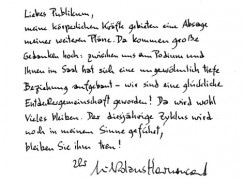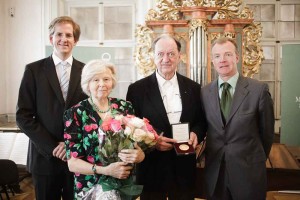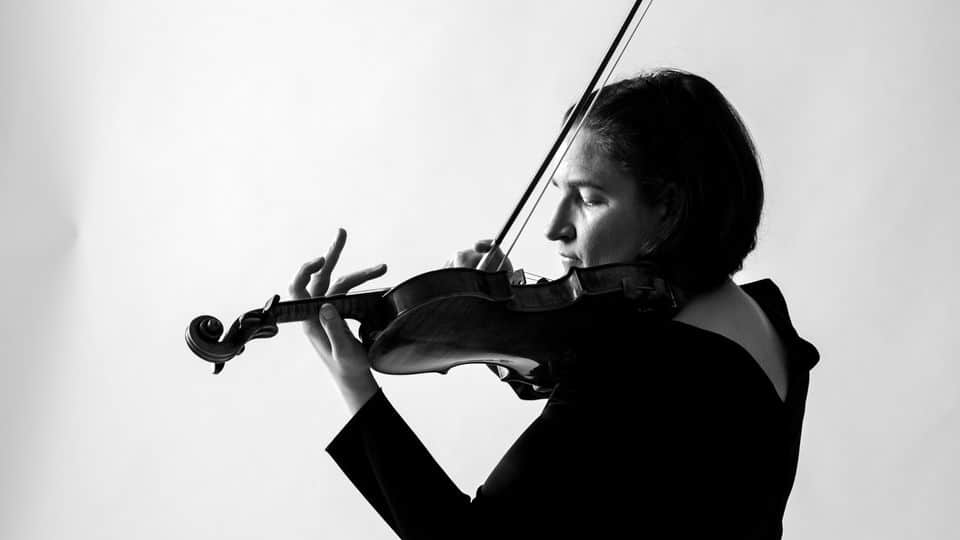Just in: Great conductor announces retirement
mainIn an insert to the programme book of a pair of Vienna concerts that he was forced to cancel through illness, Nikolaus Harnoncourt has announced that he is stepping down as head of the Concentus Musicus and will not appear again on the concert stage.

Harnoncourt, who turns 86 tomorrow (Dec 6), played cello in the Vienna Symphony Orchestra while forming his own period-instrument ensemble. He became one of the most recorded early-music conductors, branching out to direct major symphony orchestras in 19th and 20th century repertoire, all the way down to Gershwin.
A devout Catholic and devoted husband to Alice, he fostered a family feeling among players, a sense f unity rare in the often disputatious world of period practice. His recorded legacy will stand forever.






It’s unbelievably sad that just a year ago I was able to sing Nikolaus his “Happy Birthday” in Person, in fact together with another Harnoncourt Bavat Thomas Hampson, and on the eve of his 86th Birthday he leaves the stage forever, and retires from public performing- just last week we were going over the virtues and HIS changes for what was to be Leonore in the -1806 version- typical I thought and amazing !
I loose my musical father figure and yet it’s so beautiful that he leaves on his own terms– what shall happen to our Fidelio or will it be Leonore next month no one knows for now, but for the fact that it will happen. We must save the Concentus and we certainly do at the International Barocktage Melk. Vivat und Danke Nikolaus es fehlen derzeit andere Worte
Dein Freund und Mitstreiter
Michael Schade
https://www.youtube.com/watch?v=S6gYV7srFMM
I think you are singing in this, one of my favourite performances from Concentus. Fabulous. And I also loved it when Concentus was in the pit at Theater an der Wien. How hard they all worked!!!
Auf wiedersehen, Count!!
Sad news indeed! Harnoncourt’s revolutionised the way we listen to music from the classical, romantic and baroque periods. He changed our ears! Thank you so much for all your splendid work.
He didn’t change mine.
mine either
auch meine nicht
Great explorer. He has greatly contributed to the rejuvenation of classical music and helped polishing away some dross from over-romantic interpretation conventions which had become fossilized.
One of the reasons why I moved to Vienna a little more than 20 years ago was to finally have the chance to attend concerts with Nikolaus Harnoncourt, a musical hero of mine. I already knew his recordings but I still had to experience him in person. Over the years, I must have seen him between 150 and 175 times thanks to my yearly subscriptions to the Concentus musicus, to the several concerts he also gave with the Symphoniker, the Philharmoniker and the Chamber Orchestra of Europe in Vienna and in Graz. He played Monteverdi, Alban Berg, Bruckner, Gershwin, Beethoven, Dvorak, Purcell, Bartok, Mozart, Haydn, Bach, Schubert, Mendelssohn, Smetana, Offenbach, Bizet, Johann Strauss, Schumann and even Wagner… Not a single time had any of these concerts been less than fascinating, stimulating, exciting and provoking (in a good way…).
I hope he will conduct Fidelio in January as planned (I already have my tickets). Last summer’s Missa Solemnis in Graz (the last time I saw him) was a very emotional evening. While my brain accepts that this might be the last time I will have seen him, my heart still can’t accept it…
Harnoncourt changed our ears — really well-put! I will never forget the transgressive thrill of those wild rasping horns in his Handel Water Music — a completely shocking revelation of raw animal joy direct from a de-perfumed 18th Century. Or his recording of Idomeneo –Felicity Palmer’s vicious and pungent Elettra and the frightening fanaticism of the High Priest. Or his amazing Monteverdi cycle in Zurich with the revelatory production of Ponnelle. These performances have changed everything!
Oh yes! transgressive thrills indeed. Many in his Bach Cantata recordings, also.
“………..a completely shocking revelation of raw animal joy direct from a de-perfumed 18th Century.” That is strange, given that European musical life 1675 – 1800 was damp with perfume.
…damp with perfume to cover the omnipresent smell of feces, rotten teeth, sweat and horse manure.
…and it’s a safe bet to assume that in J.S.Bach’s household the smell of drying ink and baby poopoo (17 babies over the years) was the reality, not the perfume only aristocrats could afford.
In retrospect, his great performances, revelatory in as wide a scope of repertoire as any great maestro, will be remembered for what they were: brilliantly conceived and performed, unconventional but always shedding a brilliant light. May his health regain strength in retirement, I will always have memories of the most beautiful and nuanced performances I have experienced. Thanks to these marvelous artists for sharing their impressions.
I heard him conduct an electrifying Bruckner 7th in Vienna in the late 1990s.
As a young man, I remember hearing his Mozart symphony recordings on Teldec with the Concertgebouw and thinking “How is it possible to make Mozart sound ugly?” Now I cherish these performances, so, yes, he changed my ears.
As an aside, Norman, where do you see a “shaky hand” in the note above? I would love to have penmanship that fine at 55.
I will also be eternally grateful that he took up Franz Schmidt’s Das Buch mit sieben Siegeln and made a recording. Of the many versions that have been made, it’s my favorite. As is the New World symphony, the Mendelssohn 3rd & 4th, and so many others. He will be missed. Now bring on the big box releases!
I pursued my doctorate in conducting and performance practice at Illinois because I became hooked on Harnoncourt’s essays preserved in two volumes by Amadeus Press. I have deferred to him regularly with students. His Beethoven symphonies were illuminating with COE, even in an over-crowded field. The thoughtful, human giants like Harmoncourt and Alan Curtis are cherished and deeply missed.
That looks like normal to good handwriting. I bet he did that to personalize it and show that he was still able.
People wanting to see the letter in larger print can see it at Maestro Harnoncourt’s own website, where indeed you can see that his hand is steady, stylish and elegant:
http://www.harnoncourt.info/
He is indeed a truly great musician who has inspired generations of musicians to think about music in new ways, to delve deeply into the sources, to challenge existing preconceptions, and above all to try to be faithful to what the composer intended. One of the musical giants of the last 60 years.
Interesting, Robert. I’ll remove the shaky adjective.
I will forever be indebted to Maestro Harnoncourt for his unflagging support and wonderful performances. The music ALWAYS came first.
My admiration, respect, gratefulness and love continue.
Happy Birthday Maestro!
Harnoncourt is a rare example these days, of a conductor that didn’t emerge from a conservatoire conducting class. His love and pioneering work of baroque repertoire gave him a real insight in how music developed chronologically. His recordings of the Beethoven Symphonies is still, in my view the best. I learnt more from him about Mozart – he spoke about him as though he had been an old friend – than anyone else. I’m so sorry that he won’t be conducting anymore. I wish him well.
“Wir sind eine glückliche Entdeckungsgemeinschaft geworden.” What a nice way to say farewell to a loyal audience. Probably similar sentiments were expressed by the last jetsetting Chief Conductor to leave the LSO.
Perhaps no other individual has been more responsible for introducing and establishing classical musical performance according to informed historical practice than Nikolaus Harnoncourt. I became a fan in the 1960’s. Harnoncourt and his Concentus Musicus Wien introduced me to the sound of gut strings, natural (valveless) horns, wooden flutes, etc., to hear male altos (the heavenly Paul Esswood) in Bach, Monteverdi, etc. But it was not only instruments: it was a matter of phrasing, accentuation, absence of vibrato….. for them, a new way of playing, for us, a new way of hearing works with which we were familiar, albeit sounding quite differently. Today it has become the norm, and I think rightly so. But, as John Eliot Gardiner, a later figure, has said with much wisdom, it is a way of performing old music the way our 21st century ears and experience thinks it was performed, notwithstanding all the historical research that has been accomplished. Of course, I will never discard my Klemperer Matthaus Passio, or Karajan’s Schöpfung, or young Fischer-Dieskau’s Ich Habe Genug, among others. But much has been permanently removed from my shelves. And some has been kept not only for their very outré character (Beecham’s Messiah), or simply because it sounds good not only in the historical way and but also with vibrato, in lush modern instruments (Karajan’s version with the BPO of the Haydn Paris Symphonies has not been bettered in any playing style). And then, he refashioned the repertoire. Had anyone heard Rameau’s Castor et Pollux prior to Harnoncourt? Or much Telemann? Or much Monteverdi beyond Nadia Boulanger’s few madrigals? This revolution, perhaps revitalization, of music making is owed to several pioneers, but I am suggesting probably to nobody more than to Nikolaus Harnoncourt. So congratulations are due on his retirement. And a huge THANK YOU. We are so much richer for his contribution to this Art we so love. True aristocrat Harnoncourt was a revolutionary first and a conductor second, because he had no choice, it was his weapon. For the record, later in his career he branched out to modern orchestras and much later music. Indeed he has a lovely recording of the complete set of Dvorak Slavonic Dances: nothing could have been more unexpected from him which turned out so delightful. This is a well deserved retirement, one wishes him much happiness in it with his wife Alice, co-founder with him of the Concentus Musicus. And the good health to enjoy it.
I own a live version of Berg’s violin concerto “To the Memory of an Angel” with Gidon Kremer and the Vienna Philharmonic conducted by Harnoncourt that I found at some point by chance on the internet (probably a radio broadcast) and that I cherish deeply. I can only wish to anyone who likes this work that it will be released commercially at some point.
Nikolaus Harnoncourt was preparing a new cycle of Beethoven’s symphonies with Concentus Musicus Wien for Sony Music, and a first CD with symphonies 4 and 5 is scheduled for release in February 2016. I suppose the cycle as a whole is cancelled.
Harpsichordist and Harnoncourt Assistan Stefan Gottfried will take over “Fidelio”. You can find German language information on Gottfired on
https://www.mdw.ac.at/tip/lehrende?PageId=1083
According to Austrian Broadcasting, he has also worked on the Edition of “Fidelio” that will be used.
In the old days the “authentic” etc movement had a certain leftist flavour (against old style, somehow “right-wing” musicianship, e.g. “Nazi Karajan”) There was a certain irony in this, given the leading role played by the Austrian aristocrat, Count Nikolaus de la Fontaine und d’Harnoncourt-Unverzagt.
NH’s cousin Anne d’Harnoncourt was for many years the Director of the Philadelphia Museum of Art until her untimely death in 2008.
I saw Harnoncourt in Vienna in May this year and an audience member seated next to me said that he would retire very soon. I used to love his pre-concert talks and his great relationship with the Viennese public. How he will be missed.
I’ll be presenting a 2 hour lecture in his honour which will cover his life and legacy, not to mention his writings.
We love you, Maestro Harnoncourt.
Thank you.
I went to Bachtrack today thinking, “I’d love to hear Harnoncourt – live – again in 2016”. So sad to learn that he has now retired. Thank-you Maestro for so many wonderful and – yes! – ear-opening performances. My most treasured memory is of his Lucio Silla in the Theater an der Wien in 2005, with a wonderful cast including Petibon, Dasch and Fink. Unforgettable!